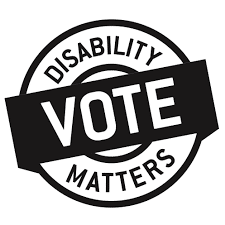“Vote as if Your Life Depends on It.” – Women’s eNews

People with disabilities may be the biggest voting bloc in the country. 40.2 million Americans with disabilities are eligible to vote in November, according to an October 2024 report by Rutgers Program for Disability Research. That’s more than the 35.7 million eligible Hispanic/Latino voters or 31.1 million Black voters.
“People with disabilities are the sleeping tiger in American politics,” said Professor Lisa Schur, co-director of the Rutgers program in a press release. “They represent a large and growing portion of the electorate, and they could make a critical difference in the outcome of this and future elections.” And whether you’re an American with a disability or a friend or family member of a disabled person, I urge you to vote in this upcoming election. There is a lot at stake for everyone, but disabled Americans may be especially affected.
During his presidency, Donald Trump led an unsuccessful bid to repeal the Affordable Care Act (ACA, also known as Obamacare). We don’t know what he would replace it with, but we do know that he supports letting Obamacare subsidies expire at the end of 2025, which would leave an estimated 3.4 million people unable to pay for insurance, and force many of us to choose between health care and other necessary living expenses.
In addition, Project 2025 calls for reducing or removing Medicaid and Social Security Disability Income (SSDI), potentially eliminating the Department of Education, and repealing health policies enacted under Biden, including a law that enabled Medicare to lower prices of 10 expensive prescription drugs by negotiating with pharmaceutical companies. (Though Trump has distanced himself from Project 2025, it’s worth noting that CNN identified at least 140 former advisers from the Trump administration who were involved with the report.)
“By seeking to gut Medicaid and Medicare, enact a nationwide abortion ban, slash VA benefits, and eliminate the Department of Education, Republicans’ extreme Project 2025 would drag the disability community backward and make it even harder for them to live safe, full and independent lives,” Illinois Senator Tammy Duckworth, a disabled veteran, told Newsweek.
“Medicaid and SSDI are the lifelines,” Eric Buehlmann, deputy executive director for public policy at the National Disability Rights Network, said in the same Newsweek interview. “People are going to lose access to services and supports that they need.”
The Harris-Walz campaign offers a sharp contrast. They plan to expand the ACA and make the current subsidies permanent. No cuts to Medicaid or SSDI or community services. Investment in mental health and suicide prevention efforts instead of the increased institutionalization proposed by Trump. An expansion to Medicare that would cover in-home care.
The Harris-Walz team is also actively engaged with the disability community. As the father of a son with a disability, Governor Walz understands our community’s needs. Vice President Harris, a long-time supporter of disability rights, played an important role in the current administration’s efforts to improve health care, which included finalizing a new rule under Section 504 of the Rehabilitation Act that prohibits discrimination on the basis of disability in programs and activities that receive funding from the U.S. Department of Health and Human Services. The campaign also hired a disability engagement adviser, a first for any national campaign. (Other campaigns have had disability policy advisers.)

As I urge you all to vote, I understand that I have it easy. I live in Oregon, where ballots are mailed to every registered voter. “Motor voting”—where voter registration forms are mailed to everyone who applies for an Oregon driver’s license or ID—removes an obstacle to voter registration. All Oregonians are allowed to vote (in many states, people with intellectual and developmental disabilities are denied the right to vote). For all these reasons, a good percentage of Oregonians with disabilities vote.
Many of you in other states face barriers: transportation issues, inaccessible ballots and/or polling places, restrictions on mail-in voting, and more. And despite new accessible voting options, barriers may actually be increasing
According to the nonpartisan Campaign Legal Center, “In advance of the 2024 election, 14 states enacted over a dozen restrictive voting laws that would disenfranchise voters with disabilities, including laws that criminalize absentee ballot assistance and narrow access to vote-by-mail.”
What can you do? Know your rights. The Help America Vote Act of 2002 (HAVA) requires each polling place to utilize a voting system that is “accessible for individuals with disabilities, including nonvisual accessibility for the blind and visually impaired,” and to provide “the same opportunity for access and participation (including privacy and independence) as for other voters.”
Not sure how to access the resources you need? State Voting Guides for the General Election are available from the American Association of People with Disabilities (aapd.com) as are plain language definitions of political language.
You can also help ensure a more accessible voting experience in the future by casting your ballot for Harris, who plans to expand mail-in voting so that more Americans can vote with the ease that I prize.
Please, make the most of this gift we have as Americans. Prove the power of the disability vote. Exercise your right to vote and think about what your vote means to our community. As Justin Dart Jr., the “father” of the Americans with Disability Act, once said, “Vote as if your life depends on it—because it does.”
About the Author: Cindy Brown recently completed her 2024 fellowship with The Loreen Arbus Accessibility Is Fundamental Program at Women’s eNews, and is a freelance writer whose clients have included The John F. Kennedy Center for the Performing Arts, the Smithsonian Institution, and the National ADA Centers. Cindy was also the statewide coordinator of ARTability, a national-award-winning arts and disability organization; a Project Development and Training Coordinator for the Arizona Office for Americans with Disabilities; the ADA & Accessibility Specialist for the city of Tempe, AZ; and the winner of the 2004 Mayor’s Award from the City of Phoenix Mayor’s Commission on Disability Issues.

